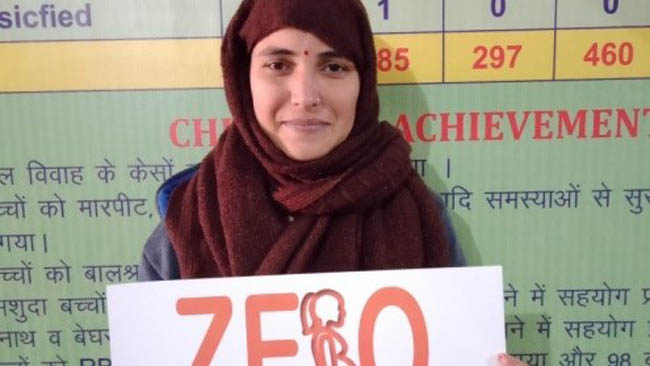
Roshini Bairwa from
Rajasthan was only two when she lost her father. Her mother abandoned her soon
after. She was raised by grandparents and relatives who all wanted to have a
say in her upbringing. A few years later, her relatives got together to marry
off the little girl. "But I wanted to study and play with other children
in the evening. The idea of marriage was so scary," Roshni said,
remembering the earlier days.
One of the days, when
the pressure was too much to take, little Roshni ran to her children's
group (balsamooh) in the vicinity and begged for help. "My
classmates, teachers and other elders all came forward to help me. They pressed
upon my grandparents to stop my marriage. With great persuasion my
grandparents agreed not to get me married off early," Roshni remembers.
Life was stable for a
few years after that but when Roshni turned 16, talks about her marriage
resumed. Once again, her relatives got into the picture. "My relatives
got a proposal for me and pressurized me to get married. I refused and my
relatives assaulted me physically. Every time I said no to a proposal, I used
to get a thrashing," recalls Roshni with pain in her
eyes. Roshni stood her ground but her neighbourhood did not
appreciate her guts. People looked down on her with disdain. Families forbade
their children from speaking with her and everywhere she went, she was treated
like a 'villain' for bringing shame to her family.
Roshni was finally
thrown out of her village. But she still stood firm and continued on her
mission of getting herself educated. After a lot of financial and personal
struggle, Roshni graduated in Arts.
Education gave Roshni
the confidence to lead life on her terms. "I realised that like me, there
may be many other girls who may be forced to get married against their wishes.
There will also be some who may want to study more and cannot because of early
marriage plan. I decided to do my bit for other girls."
Roshni started taking an active role in homes where
young girls were being forced into marriage. She went around counselling
parents, grandparents and even neighbours and even discussing the ills of early
marriage and motherhood.
Today, people identify her village as Roshni's
village but for this crusader, completely eliminating child marriage is a
Herculean task. "Being thrown out of the village did not stop me
from staying in touch with the children of the village. I don’t have
anything to lose now, since being ousted from my own village and all I care
about is that no one should go through what I did as a little girl.”
Roshni adds, "To empower the voices that
matter, I have now joined the #ZeroTeenMothers campaign stated by
National NGO Population Foundation of India and which aims to create
greater awareness around teenage pregnancy in the state of Rajasthan. One-fifth
of Rajasthan’s population are adolescents and we need to fight for their
improved health for the country to have a better tomorrow," she signs
off.
#ZeroTeenMothers campaign has gathered the
uninhibited support of Rajasthan policymakers who believe in making a tangible
change. The campaign was launched on the occasion of National Youth Day on
January 12, 2020 and has received support across state. The campaign hopes to
set-off a re-think on the issue of teenage pregnancy in Rajasthan.
Population Foundation of India is a national civil society organisation,
which promotes and advocates effective formulation and implementation of
gender-sensitive population, health and development strategies and
policies. Bharat Ratna JRD Tata founded PFI in 1970. PFI addresses population
issues within the larger discourse of empowering women and men so that they are
able to make informed decisions related to fertility, health, and
well-being.Population Foundation of India has already held eight youth-led
consultations across the country to identify and put forward challenges and
recommendations to improve adolescent health. PFI also works in Uttar Pradesh
and Bihar to increase awareness of adolescent health programmes and expand
health services especially for the vulnerable.